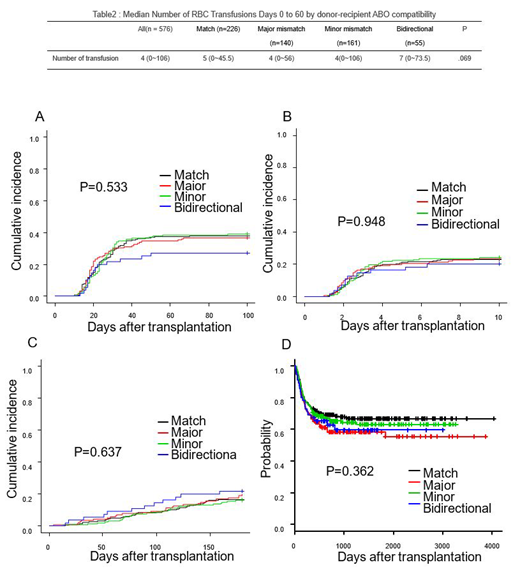Objective
In contrast to solid organ transplantation, ABO blood group incompatibility was acceptable in allogeneic hematopoietic stem cell transplantation (allo-HSCT). However, reports of the effect of donor-recipient ABO incompatibility on long-time survival, graft-versus-host disease (GVHD), and relapse after allo-HSCT were controversial. Relatively few reports existed on the effects of ABO incompatibility after umbilical cord blood transplantation (UCBT). The aim of this study was to investigate the role of major ABO incompatibility on RBC transfusion burden, hematologic recovery, GVHD, transplant-related mortality (TRM), relapse, and overall survival (OS) in UCBT for malignant disease.
Methods
This retrospective study included 587 malignant hematonosis patients who received myeloablative single-unit unrelated donor UCBT at our center between May 2008 and June 2018. Median follow-up time of the patients alive was 40.7 months (range: 12.0-134.6 months). A total of 230 (39.2%) patients received an ABO-identical transplant, and 357 (60.8%) received ABO-mismatched transplants, including 161 (27.4%) minor, 141 (24.0%) major, and 55 (9.4%) bidirectional ABO-incompatible UCBTs. All patients received myeloablative conditioning regimens and cyclosporine A (CsA) combined with mycophenolate mofetil (MMF) as a GVHD prophylaxis.
Results
A comparison of ABO compatibility and incompatibility demonstrated no significant differences (P>0.05) in the cumulative incidence of neutrophil, platelet, and red blood cell engraftment . There was no significant difference in the cumulative incidence of grades Ⅱ to Ⅳ aGVHD (P= .527) and Ⅲ to Ⅳ aGVHD (P= .949) among the 4 groups (Figure A , B). In univariate analysis, ABO blood group incompatibility was not associated with cumulative incidence of 180d TRM (Figure C, P= .602). The overall 3-year survival had no statistically significant differences among the 4 groups (Figure D; P= .384). Further, 11 patients were excluded from the analysis of post-UCBT RBC transfusion burden because of missing data and non-red blood cell engraftment. Of the remaining 576 patients, the median number of RBC transfusions during transplant days 0 to 60 was 4 (range, 0 to 106). There was no significant difference in the transfusion burden among all ABO blood type mismatch groups (Table 1, P = .069). Furthermore, none of the patients developed pure red aplastic anemia (PRCA) after UCBT.
Conclusion
The results showed that ABO blood group incompatibility had no significant impact on hematologic engraftment, the occurrence of GVHD, and the survival of malignant hemoblastosis. Patients with myeloablative single-unit UCBT may not develop PRCA; Donor-recipient ABO incompatibility may not be the major consideration in the selection of umbilical cord blood.
No relevant conflicts of interest to declare.
Author notes
Asterisk with author names denotes non-ASH members.


This feature is available to Subscribers Only
Sign In or Create an Account Close Modal